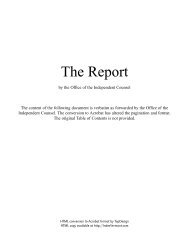THE ENTRENCHING OF INCUMBENCY_ ... - Lou Frey Institute
THE ENTRENCHING OF INCUMBENCY_ ... - Lou Frey Institute
THE ENTRENCHING OF INCUMBENCY_ ... - Lou Frey Institute
Create successful ePaper yourself
Turn your PDF publications into a flip-book with our unique Google optimized e-Paper software.
<strong>THE</strong> <strong>ENTRENCHING</strong> <strong>OF</strong> <strong>INCUMBENCY</strong>: REELECTIONS IN <strong>THE</strong> U.S. HOUSE <strong>OF</strong> REPRESENTATIVES, 1790-1994<br />
successful at the beginning of the century, when old hierarchical and deferential social structures remained in place.<br />
But in the election of 1842 the survival rate of incumbents bottomed out at 64 percent. That same year so many<br />
incumbents chose not to run for reelection that Congress experienced a 76-percent turnover. By the 1840s, the<br />
reelection rate for incumbents attempting to maintain office settled into an average range where 20 to 30 percent<br />
regularly went down to defeat. This attrition rate due to defeat continued almost up until 1900. Adding in voluntary<br />
retirements, the total turnover rate in Congress averaged more than 50 percent per election between 1840 and 1880.<br />
Many of the founding fathers would have looked askance at the U.S. House of Representatives of the mid-19th<br />
century, dominated as it was, not by the nation's leading characters, but by quite ordinary men. The famous French<br />
traveler and aristocrat, Alexis de Tocqueville, while admiring much of what he saw in America, was disdainful of the<br />
lower house of the United States legislature. "On entering the United States House of Representatives in Washington,"<br />
sniffed de Tocqueville ([1835] 1965: 103), "one is struck with the vulgar demeanor of that great assembly." He added<br />
that "the eye frequently does not discover a man of celebrity within its walls." The body contained "almost all obscure<br />
individuals," including "village lawyers, men in trade, or even persons belonging to the lower classes of society." The<br />
U.S. House of Representatives in the mid-1800s came as close as it ever would to a true citizen legislature. In the same<br />
report, de Tocqueville pointed out that the Senate, by contrast, contained gentlemen who compared favorably with<br />
their European counterparts. Madison and Jefferson would have at least appreciated the contrast between the two<br />
houses. Madison's goal of a lower house that was immediately reflective of the people was realized in the 19th century.<br />
While the belief in social and political deference that existed during the age of the nation's founding faded, the<br />
republican principle of voluntary rotation did not. In fact, the custom became more prevalent as a result of the rise of<br />
party politics and the birth of "the spoils system" (McCormick 1986) under Jackson. The spoils system constituted a<br />
new form of rotation, where tenure in appointed office became limited by the duration of the authority of the<br />
appointee's political allies. When Jackson spoke of the disadvantages of allowing individuals to hold public office for<br />
extended periods of time, he meant all public offices, including administrative ones. Since all offices were public<br />
property, they were free to be distributed to the party faithful. According to the Jacksonians, such a rotation not only<br />
rewarded political allies, but also discouraged the corruption that stems from long tenure in office.<br />
Acceptance of the idea of office rotation became so dominant during the 19th century that a set of unwritten rules<br />
evolved. In district political conventions, party leaders took turns holding elected office. In 1824 the New York<br />
Statesman (as quoted in Struble 1979: 659) reported that "perhaps most" of the turnover in the state's congressional<br />
delegation was the result of "an arrangement, by which it is stipulated that, after a given time, one aspirant for office is<br />
to succeed another."<br />
Often counties took turns sending representatives to Washington, in a geographic rotation. In 1869, the Christian<br />
Examiner (as quoted in Struble 1979: 660) noted the "constant temptation, in a district made of an aggregation of<br />
counties or towns, to pass the office from town to town, or county to another each claiming in its turn the honor of<br />
furnishing the member."<br />
One of the most well-known examples of the practice of rotation involved Abraham Lincoln. In describing Lincoln's<br />
7th Illinois Congressional District, his secretaries, John Nicholay and John Hay, reported (as quoted in Struble 1979:<br />
659-60),<br />
The Sangammon district was one which the Whigs of Illinois had apparently the best prospect of carrying,<br />
and it was full of able and ambitious men, who were nominated successively for the only place which<br />
gave them the opportunity of playing part in the national theater at Washington.<br />
Lincoln, by agreement, served only one term in Congress. When the subject of running for reelection came up, Lincoln<br />
wrote (as quoted in Struble 1979: 660), "to enter myself as a competitor of another, or to authorize anyone so to enter<br />
me, is what my word and honor forbid." The man who succeeded Lincoln, Steven Logan, was the same man who had<br />
nominated Lincoln two years earlier.<br />
The strong party system of the 19th century contributed to rotation of offices by encouraging compromises between<br />
politicians and different geographic regions within congressional districts. A candidate's fate was closely tied to the<br />
fate of his political party and the presidential candidate that headed the ticket. Therefore a candidate would not<br />
http://www.cato.org/pubs/journal/cj14n3-2.html[9/13/2011 1:45:53 PM]



